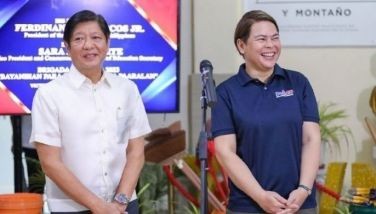Culture of impunity, system of iniquity

May 13, 2005 | 12:00am
No, the Paris-based Reporters Without Borders told the Vienna-based International Press Institute after successive visits to Manila in March and April. It is not only a pervasive culture of violence that leads to maiming and killing of Filipino journalists. More than a knee-jerk use of force in lieu of discourse, there is also a worse culture of impunity. Attackers, mostly corrupt local politicos and crime bosses, know they can get away with it.
Sixty-one journalists have been murdered since the restoration of a free press and the fall of Marcos dictatorship in 1986. Thirteen of the slayings were committed last year alone. Since January, there have been seven attacks on journalists; five of them died of gunshot wounds. Less than a fourth of the crimes have been solved with the arrest of the gunmen. In only one case was a mastermind identified and indicted, then acquitted. Most of the "solved" cases still pend in court.
The dismal arrest and conviction record can only embolden more killings. Since the December establishment of its hotline, the National Union of Journalists of the Philippines has received dozens of reports of death threats on newsmen, mostly radio broadcasters. No wonder, the New York-based Committee to Protect Journalists declared on World Press Freedom Day last week that the Philippines is the "most murderous country for journalists." Worse even than war-torn Iraq or drug-infested Colombia or gangster-led Russia.
Not only journalists fall victim to the twin cultures of violence and impunity, to be sure. Politicians and bureaucrats too are being killed for bitter rivalries. Among them are mayors in Ilocos and Laguna, a former congressman in Pasig, an airport official in Pasay, a police colonel in Manila, and a Customs officer in Cebu. And because it’s follow-the-leader, ordinary citizens too turn to violence with impunity. Traders kidnap competitors not for ransom but revenge; residents attack neighbors for the littlest tiff; youths turn innocent stares into brawls. Most get away with it, thus encouraged to repeat.
All these mirror a flawed system, one of iniquity. The noble structure envisioned by the Constitution – of equality, justice and welfare – is not working. In its stead is a system of the rich and powerful over the poor and weak. The former get richer and more powerful, while the latter get poorer and weaker. The only chance of the poor and weak to advance is to align with the rich and powerful, as gofers or henchmen in such activities as illegal logging, smuggling, drug trafficking, jueteng, dirty politics, or all of those combined. Evidence has been advanced that many local and national politicians are themselves into big-time corporate crime and vice, but are above the law because they also happen to select the local and national enforcers. The cultures of violence and impunity in effect rest on the system of iniquity.
Enter the journalist, who uses pen or microphone to expose the wicked system, hoping perhaps to destroy or even only dent it. At first he would strive to talk the poor and weak out of it by citing studies. For instance, that malnutrition is high in communities where jueteng thrives, or that two out of three offenses are shabu-related, or that logging ruins not only the mountains but also the air and seas. But the politically connected crime bosses invariably ignore him and all the more entice the common folk into their nefarious trades. So the journalist aims higher, this time lambasting the rich and powerful criminals by name or blind item. This provokes death threats. Sometimes he would retreat to fight another day; prudence after all is the better part of valor. Other times he would criticize harder, thinking he has the culprit panicking; besides, he target-practices with his handgun. And then comes the inevitable strike arising from the cultures of violence and impunity. Killing is the ultimate silencer.
Given the chance, a journalist would always prefer to live a quiet life. Under normal times, he would be covering occasional corruption and crime, but more often analyzing government policies or dwelling on culture and nature. But in the Philippines, there are many evils to fight, and the persons authorized and paid to do it are not performing. So the journalist must fill the void and take up the cudgels for the poor and weak. The rich and powerful will try to stop him with violence and impunity. Killings have become so rampant it’s like a normal risk of the trade.
Violent attacks on journalists have become a national issue. It is not so much due to surviving journalists pushing it to the fore, than ordinary folk becoming more despondent from losing their last defenders to the forces of iniquity.
Journalists have begun discussing ways to protect themselves: carry weapons, do not establish movement patterns, change routes often, prepare lists of potential attackers, so on and so forth. Yet their foremost defense is not in their hands, but with the authorities tasked to enforce and defend the Constitution. Sadly, they must push such authorities to do the job. Part of the pushing is exposing the wrongs of the officials, criticizing law enforcers and hitting the weak spots of the evil structure. But the system is too deep-rooted and tough and has a way of resisting change. Not even elections and revamps can do the trick. And so journalists must pound on, clod by clod, for his very existence depends on it. Ironically, the mission can cost him his life or limb. What a system!
E-mail: [email protected]
Sixty-one journalists have been murdered since the restoration of a free press and the fall of Marcos dictatorship in 1986. Thirteen of the slayings were committed last year alone. Since January, there have been seven attacks on journalists; five of them died of gunshot wounds. Less than a fourth of the crimes have been solved with the arrest of the gunmen. In only one case was a mastermind identified and indicted, then acquitted. Most of the "solved" cases still pend in court.
The dismal arrest and conviction record can only embolden more killings. Since the December establishment of its hotline, the National Union of Journalists of the Philippines has received dozens of reports of death threats on newsmen, mostly radio broadcasters. No wonder, the New York-based Committee to Protect Journalists declared on World Press Freedom Day last week that the Philippines is the "most murderous country for journalists." Worse even than war-torn Iraq or drug-infested Colombia or gangster-led Russia.
Not only journalists fall victim to the twin cultures of violence and impunity, to be sure. Politicians and bureaucrats too are being killed for bitter rivalries. Among them are mayors in Ilocos and Laguna, a former congressman in Pasig, an airport official in Pasay, a police colonel in Manila, and a Customs officer in Cebu. And because it’s follow-the-leader, ordinary citizens too turn to violence with impunity. Traders kidnap competitors not for ransom but revenge; residents attack neighbors for the littlest tiff; youths turn innocent stares into brawls. Most get away with it, thus encouraged to repeat.
All these mirror a flawed system, one of iniquity. The noble structure envisioned by the Constitution – of equality, justice and welfare – is not working. In its stead is a system of the rich and powerful over the poor and weak. The former get richer and more powerful, while the latter get poorer and weaker. The only chance of the poor and weak to advance is to align with the rich and powerful, as gofers or henchmen in such activities as illegal logging, smuggling, drug trafficking, jueteng, dirty politics, or all of those combined. Evidence has been advanced that many local and national politicians are themselves into big-time corporate crime and vice, but are above the law because they also happen to select the local and national enforcers. The cultures of violence and impunity in effect rest on the system of iniquity.
Enter the journalist, who uses pen or microphone to expose the wicked system, hoping perhaps to destroy or even only dent it. At first he would strive to talk the poor and weak out of it by citing studies. For instance, that malnutrition is high in communities where jueteng thrives, or that two out of three offenses are shabu-related, or that logging ruins not only the mountains but also the air and seas. But the politically connected crime bosses invariably ignore him and all the more entice the common folk into their nefarious trades. So the journalist aims higher, this time lambasting the rich and powerful criminals by name or blind item. This provokes death threats. Sometimes he would retreat to fight another day; prudence after all is the better part of valor. Other times he would criticize harder, thinking he has the culprit panicking; besides, he target-practices with his handgun. And then comes the inevitable strike arising from the cultures of violence and impunity. Killing is the ultimate silencer.
Given the chance, a journalist would always prefer to live a quiet life. Under normal times, he would be covering occasional corruption and crime, but more often analyzing government policies or dwelling on culture and nature. But in the Philippines, there are many evils to fight, and the persons authorized and paid to do it are not performing. So the journalist must fill the void and take up the cudgels for the poor and weak. The rich and powerful will try to stop him with violence and impunity. Killings have become so rampant it’s like a normal risk of the trade.
Violent attacks on journalists have become a national issue. It is not so much due to surviving journalists pushing it to the fore, than ordinary folk becoming more despondent from losing their last defenders to the forces of iniquity.
Journalists have begun discussing ways to protect themselves: carry weapons, do not establish movement patterns, change routes often, prepare lists of potential attackers, so on and so forth. Yet their foremost defense is not in their hands, but with the authorities tasked to enforce and defend the Constitution. Sadly, they must push such authorities to do the job. Part of the pushing is exposing the wrongs of the officials, criticizing law enforcers and hitting the weak spots of the evil structure. But the system is too deep-rooted and tough and has a way of resisting change. Not even elections and revamps can do the trick. And so journalists must pound on, clod by clod, for his very existence depends on it. Ironically, the mission can cost him his life or limb. What a system!
BrandSpace Articles
<
>
- Latest
- Trending
Trending
Latest
Trending
Latest
Recommended



























